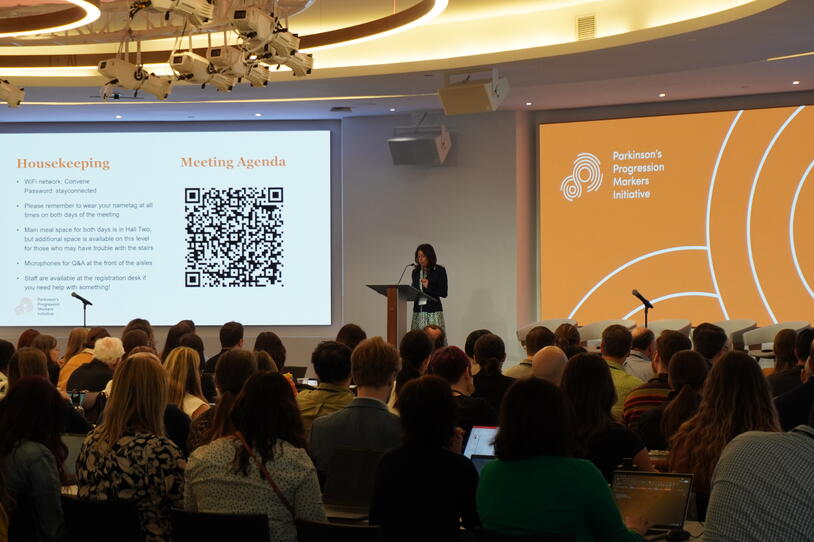
MJFF's Sohini Chowdhury, chief program officer, presenting at the 2025 PPMI annual investigator's meeting.
Reflecting on 15 years of accomplishments, the ambitious future of the Parkinson’s Progression Marker Initiative (PPMI) took center stage at the PPMI Annual Investigator’s Meeting in New York City, April 27-30.
“PPMI’s goal is to develop the tools required to enable precision medicine for Parkinson’s disease,” said Kenneth Marek, MD, president and senior scientist at the Institute for Neurodegenerative Disorders (IND), principal investigator of PPMI and special scientific advisor to The Michael J. Fox Foundation. “That's a big, high bar that we're not going to shy away from.”
PPMI By the Numbers
Since its launch in 2010, PPMI milestones have included:
- more than 4,000 people enrolled in the clinical study
- nearly 30,000 participants registered in myPPMI
- more than 47,000 individuals enrolled in PPMI online
- about 140,000 people consented to take a smell test
- 3,000 alpha-synuclein seed amplification assays (aSyn-SAA) completed; this test detects abnormal alpha-synuclein protein—known as the Parkinson’s protein—in spinal fluid
- 7,000 Dopamine Transporter Scans (DaTscans), an imaging test that assesses dopamine function in the brain
The Latest Research Developments
At the PPMI Annual Investigator’s Meeting, researchers presented on several key developments from the PPMI study that could improve early detection and speed the development of new treatments.
PPMI Expansion: While the PPMI study originally focused on enrolling people with early symptoms of Parkinson’s disease, a recent study expansion will offer insights into the period before symptoms start. The expansion includes screening individuals aged 40 or older without symptoms of PD for potential enrollment at one of 50 sites in 12 countries. Additionally, anyone aged 18 or older in the United States, including people with Parkinsons and those without, can participate in PPMI by contributing data through the newly redesigned myPPMI study participant platform.
A Biological Staging System: With the advent of aSyn-SAA, scientists are developing a new Parkinson’s disease staging system for research—the Neuronal alpha-Synuclein Disease Integrated Staging System (NSD-ISS). The goal is to better characterize how the disease progresses and to help drug developers target specific types of PD biology.
Path to Prevention: With the goal of stopping Parkinson’s disease before it starts, researchers for the Path to Prevention (P2P) platform trial received open acknowledgment from U.S. regulatory authorities in December, meaning clinical trials are on the horizon. A platform trial is a type of clinical trial designed to test multiple treatments or interventions for a specific disease or condition, using a common infrastructure.
aSyn-SAA Negative Status: Scientists are studying the differences among PPMI participants with Parkinson’s who are SAA-negative, a group whose disease biology is not well understood, with the goal of more targeted care.
Skin Biopsy for aSyn-SAA: Researchers are investigating novel approaches to detecting aSyn in different body tissues. Research on skin-based tests show promise.
Reanalyzed DaTscans: Research on PPMI imaging data have led to optimized approaches to DaTscan analysis. To improve brain imaging and to better detect changes over time, investigators reanalyzed 7,000 previously acquired DaTscans. This approach will be the new standard for DaTscan analysis in PPMI going forward.
myPPMI Continues to Innovate: myPPMI—a virtual research hub that collects and provides research information—is expanding opportunities in the U.S. and the U.K., to Germany, Spain and the Netherlands. Through myPPMI, anyone can participate in PPMI research by contributing data to any of a number of different opportunities.
Online PPMI: PPMI online, an observational study collecting information from people with or without Parkinson’s disease, is now offered on the myPPMI platform. Over 47,000 participants contribute data, expanding the reach of the PPMI study to recruit a representative cohort.
Return of Results: PPMI continues to strengthen its return of research information (RORI) initiative through myPPMI. Interested participants may access some of their research information and are offered counseling and support to help understand these data. Researchers are evaluating participants’ experience in learning research information and if this return of information affects healthcare-related behavior.
Not in PPMI? Join through michaeljfox.org/ppmi.
PPMI’s Future
Research innovation, participant engagement and industry partnerships all energize PPMI, concluded Dr. Marek. “With continued support and collaboration, we remain on the cusp of even greater progress,” he said.
PPMI is a $750-million public-private partnership. Major funding for PPMI comes from Aligning Science Across Parkinson's (ASAP), a global research initiative focused on accelerating the pace of discovery for Parkinson’s disease. ASAP support is enabling expanded PPMI recruitment efforts and remote testing as well as assay development efforts to enable breakthroughs such as αSyn-SAA. This infrastructure provides a ready platform for future discoveries.
In addition to ASAP, PPMI is supported by the Edmond J. Safra Foundation, the Farmer Family Foundation, Connie and Steven Ballmer, and Susan and Riley Bechtel. The study is additionally funded by a consortium of more than 40 biotech and pharmaceutical firms providing financial and in-kind support, and by tens of thousands of individual donors to The Michael J. Fox Foundation.